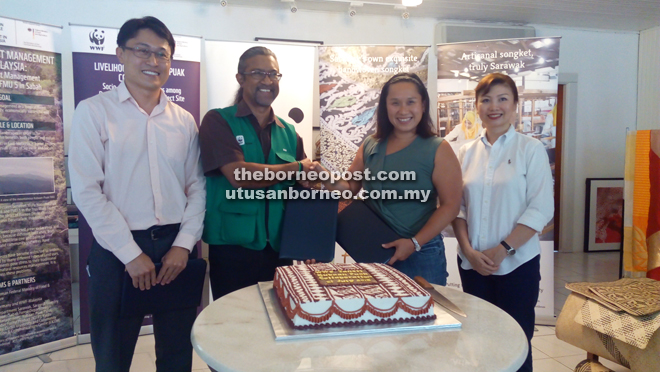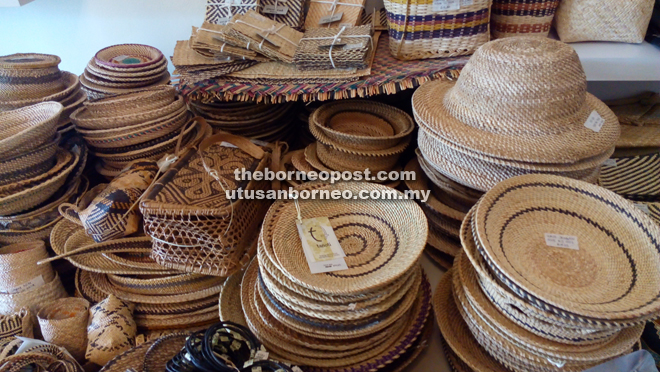
Dr Dionysus (second left) exchanging the signed MOA with Fong, while Hon (left) and Ngo look on.

The MOA focuses on development of non-timber forest products such as rattan into high value crafts that provide viable income to the communities involved.
KUCHING: World Wide Fund for Nature – Malaysia (WWF-Malaysia) signed a Memorandum of Agreement (MOA) with Tanoti Sdn Bhd to promote non-timber forest products in Kubaan-Puak area in Ulu Tutoh, Miri Division.
The two-year scope of collaboration covers workshops and training, marketing of non-timber forest products, awareness programmes and exchanging information as deemed beneficial to both parties.
According to WWF-Malaysia executive director and chief executive officer Datuk Dr Dionysus Sharma, the organisation is working with Penan communities in Kubaan-Puak forest management units to develop handicrafts, establish market links and develop entrepreneurship for rattan craft products.
“This will help to generate income for the local communities that can be sustained over a long period. WWF-Malaysia has strong technical backings in influencing and advising the conservation of forests, but lacks the expertise in the marketing of non-timber forest handicraft products and entrepreneurship development.
“This is where Tanoti’s marketing expertise comes in. Tanoti will help with the capacity building, development of local communities to produce handicrafts, identify and market handicraft products. It will also conduct quality control of these products, including monitoring the skills and efficiency in production,” he said at the signing ceremony held at Tanoti House, Tabuan Road yesterday.
Dionysus pointed out that conservation is not just looking at different species, but is also about the people, environment and livelihood where they can continue their cultural activities for as long as they wish.
“From daily use items, which can be turned into crafts or art pieces that people would want to collect, which means the products have monetary value. This opens up opportunity for the community to have a better life,” he added.
Meanwhile Tanoti director Jacqueline Fong explained that through the collaboration, it is hoped that the livelihood of forest communities will be elevated.
“Tanoti focuses on high-value handcrafts to improve lives and livelihoods. Apart from our core business of songket weaving, we developed our community initiative in rattan craft because we recognise the importance of preserving our forests and to ensure that forest communities continue to have access to an abundance of this important resource.
“In this particular project Tanoti intends to extract value from non-timber forest products by converting them into marketable crafts and then into income for the artisans.
“Our objectives are to inject the critical elements of design, quality control and marketing into the craft products of the Kubaan-Puak communities and realise viable income for the artisans and their families,” she said.
She hoped the two-year MOA could be extended to a longer period for the long-term benefit of the communities involved
Also present at the MOA signing were WWF-Malaysia Sarawak programme leader Dr Jason Hon and Unimas Faculty of Applied and Creative Arts associate professor Dr June Ngo, who will be assisting in upskilling the communities so that higher value may be extracted from their craft products.
The Kubaan-Puak Corridor project is about 360,000 hectares, involving 17 Penan communities and one Kelabit community and covering multiple forest management units between Mulu National Park and Pulong Tau National Park.
It is part of the Heart of Borneo Trilateral Corridor Initiative as endorsed by the governments of Malaysia, Indonesia and Brunei.
